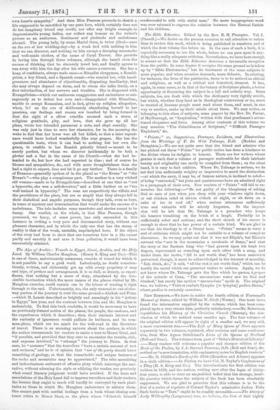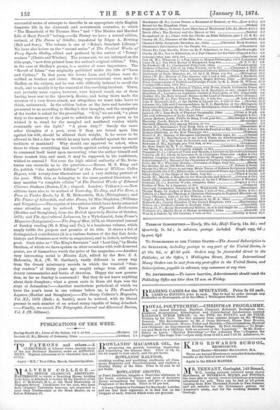NEW Enrrions.—We have to notice the fourth edition of Townsend's
Manual of Dates, edited by William W. Croft (Warne). Our tests have found the information supplied by the volume, which has been com- pleted up to a very recent date, perfectly satisfactory. —Mr. Robertson republishes his History of the Christian Church (Murray), the con- clusion of which we noticed some months ago. The four volumes of the original edition will appear in eight of a smaller and, we may add, a more convenient size.—The Life of Mary Queen of Scots appears separately in two volumes, reprinted, after revision and some condensa- tion, from Miss Agnes Strickland's Lives of the Queens of Scotland (Bell and Sons). The volumes form part of "Bohn's Historical Library.' —Many readers will welcome a popular and cheaper edition of the Book of the Psalms, by J. J. Sthwart Perowrie, D.D. (Bell and Sons), de- scribed as "a new translation, with explanatory notes for English readers." —Mr. G. Gilfillan's Bards of the Bible (Hamilton and Adams) appears in a sixth edition.—In Fiction we have Col. M. Taylor's Confessions of a Thug (H. S. King and Co.). The introductionto the first edition was written in 1839, and the author,-writing now after the lapse of thirty- four years, is able to state an unqualified belief that the strange, horri- ble practice which forms the subject of the book has been absolutely suppressed. We are glad to perceive that this volume is to be the first of a series of reprints of Colonel Taylor's admirable Indian Tales Such books as "Tara" ought to be readily accessible.—The Diary of Lady Willoughby (Longmans) was, wo believe, the first of that highly
successful series of attempts to describe in an appropriate style English domestic life in the sixteenth and seventeenth centuries, to which The Household of Sir Thomas More " and " The Maiden and Married Life of Mary Powell " belong.—In Poetry we have a second edition, revised, of The Poems of Schiller, translated by Edgar A. Bowring (Bell and Sons). The volume is one of "Bohn's Standard Library." We have also before us the "second series" of The Poetical Works of Percy Bysshe Shelley, edited and prefaced by the author of " Tenny- soniana " (Chatto and Windns). The poems are, we are informed on the title-page, " now first printed from the author's original edition." This, in the case of Shelley's poems, is a matter of some importance. The "Revolt of Islam" was originally published under the title of "Leon and Cythna." In that poem the lovers Laon and Cythna were de- scribed as brother and sister. Strong representations were made to Shelley on the subject, and he was with difficulty induced to recall the work, and to modify it by the removal of this revolting incident. Three, and probably more copies, however, wore beyond recall, one of them having been sent to the Quarterly Review, and being there made the occasion of a very fierce attack, not altogether, we must take leave to think, undeserved. In the edition before us the hero and heroine are presented to us according to Shelley's first thoughts, and the sympathy of the reader is asked for the proceeding. "It is," we are told, " a pious duty to the memory of the poet to substitute the perfect poem as he wished it to stand for the mangled and mutilated version which eventually saw the light." "A pions duty !" Surely the more sober thoughts of a poet, even if they are forced upon him against his will, should be allowed their weight. Is he never to be allowed to blot a line in which he may have offended against the moral instincts of mankind? Why should our approval be asked, when those to whom everything that revolts against society seems specially to commend itself insist upon uncovering what the author himself and those nearest him, and most, it may be supposed, in his confidence, wished to conceal ? Not even the high ethical authority of Mr. Swin- bnrne can reconcile us to the practice.--Messrs. H. S. King and Co. publish "the Author's Edition" of the Poems of William Cullen Bryant, with twenty-four illustrations and a very striking portrait of the poet. With this, as belonging to the same poetical literature, we may mention "a complete edition" of The Poetical Works of Edmund Clarence Stedman (Boston, U.S.: Osgood. London : Triibner.)—New editions have also to be noticed of Yesterday, To-Day, and For Ever, a Poem in Twelve Books, by E. H. Bickersteth, M.A. (Rivingtons); and
The Pastor of Silverdale, and other Poems, by Miss Stapleton (Williams
and Norgate).—The reprint of two articles which have lately attracted some attention may be noticed. These are Plymouth Brethrenism (Hodder and Stoughton), from the British Quarterly Review of October, 1873; and The Agricultural Labourers, by a Wykehamist, from Fraser's Magazine (Longmans).—The Day of Rest, 1873, an illustrated journal
of Sunday reading (H. S. King and Co.), is a handsome volume, which amply fulfils the purpose and promise of its title. It shows a list of distinguished contributors (it is a curious feature of the day that Arch- bishops and Premiers now write in magazines), and is, indeed, uniformly good. Such tales as " The King's Servants " and "Lost Gyp," by Hesba Stretton, of which we have spoken on other occasions with well-deserved praise, are of themselves worth the price of the magazine.—Another very interesting serial is Mission Life, edited by the Rev. J. J. Holcombe, M.A. (W. W. Gardner), vastly different in every way from the dreary missionary records in which the wearied "Sun- day readers " of thirty years ago sought refuge from still more dreary commentaries and books of devotion. Happy the new genera- tion, as far as Sunday is concerned ! But they do not know anything about their Josephus ; what a green oasis in those old days was the siege of Jerusalem 1—Another meritorious periodical, of which we have the year's issue in one volume before us, is The Preacher's Lantern (Hodder and Stonghton).—The Stamp Collector's Magazine, Vol. XL, 1873 (Bath : A. Smith), must be noticed, with its liberal present in each number of an actual stamp capable of being detached. —Finally, we record The Telegraphic Journal and Electrical Review, Vol. I. (H. Gillman).



































 Previous page
Previous page